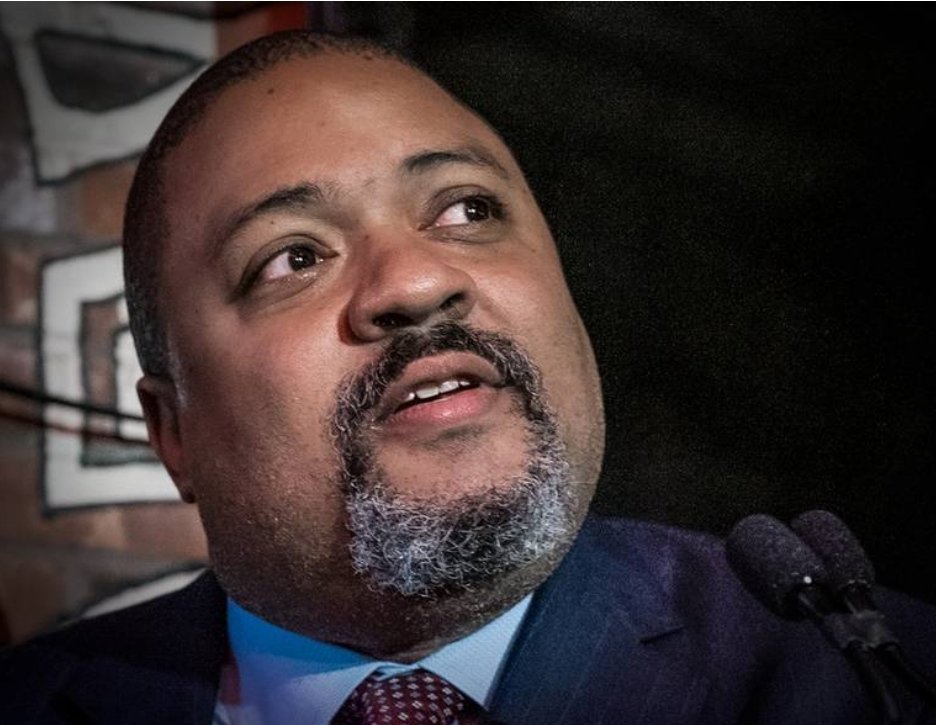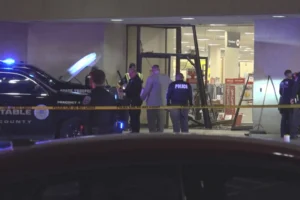Manhattan DA moves to clear sex trafficking victims’ criminal records

When a 25-year-old sex trafficking victim defended herself against a buyer who tried to rape her during a violent 2013 transaction, he called the cops. She was arrested. Manhattan prosecutors then convicted her of felony assault.
Nine years later — and an ex-con in the eyes of prospective employers and landlords — prosecutors no longer consider the woman a criminal.
The now 33-year-old is one of eight sex trafficking victims whose criminal records prosecutors have recently agreed to erase. Their sealed rap sheets run the gamut from drug dealing to bank robbery.
DA Alvin Bragg’s new human trafficking chief said that saddling victims with records made them more vulnerable and susceptible to remaining in the sex trade. The women had been punished for crimes they were forced to commit out of desperation and necessity — offenses they might not have otherwise. Captors often compel their victims to engage in illegal behavior as a means of ensnaring and controlling them.
“We very often see young women who are estranged from their families, for one reason or another. They may be in the foster care system. They may be in a group home. We’ve even had survivors who were trafficked out of mental health care facilities, because they were hospitalized for mental illness,” Justin McNabney said.
“The trafficker is looking for those vulnerabilities, and then the trafficker is promising to make up for whatever is missing in [their] life.”
In an effort to help the victims move forward, McNabney said social workers embedded at the DA’s office are working to connect them with housing, counseling, job programs, and other critical services they might need.
The push comes after New York’s passage of the Survivors of Trafficking Attaining Relief Together (START) Act in November. The bill allows trafficking victims to petition the courts to vacate their convictions. The DA has consented to nine motions under the new law, and four more are pending.
McNabney said prosecutors are taking it a step further by moving to dismiss any open case against a victim of sex trafficking, not just old ones.
The shift to going after traffickers represents the latest transition in law enforcement’s evolved stance on policing forced sexual exploitation. Similar initiatives in New York and at least 15 other states have seen prosecutors take the onus off sex workers and instead go after pimps and johns.
Last year, former Manhattan DA Cy Vance Jr. said the office would no longer prosecute people charged with prostitution or unlicensed massage and moved to dismiss more than 5,000 loitering-for-the-purposes-of-prostitution cases.
Bragg supports a set of bills before the state Legislature that would eliminate the statute of limitations for sex trafficking, expand protections for mentally disabled survivors of trafficking, and extend the window for victims to sue their former captors.
A Bronx couple arrested in February is one of 12 sex trafficking cases the DA is currently prosecuting.
Prosecutors say that state-certified foster parent Sharice Mitchell, 51, started advertising a young woman in her care for her husband’s prostitution business just a month into her placement. They say the husband, 38-year-old Kareem Mitchell, physically abused the victim and seven more in his custody and forced them to have sex with strangers in parked cars all over the city and at seedy hotels in Midtown.
Their experiences are emblematic of a much wider problem of sexual exploitation and labor trafficking in New York, which ranks fourth in the nation for reported cases, according to the National Human Trafficking Resource Center.
According to the data, most victims of sex trafficking are Black and Hispanic women, and children as young as 12. They are primarily from underserved communities and are more likely to run into poverty, unemployment and immigration issues, perpetuating the circumstances that prime them for trafficking.
The office’s sympathetic new approach toward victims of sex trafficking comes amid criticism from victims in a number of high-profile cases. Last month, Bragg came under fire by a victim of actor Cuba Gooding Jr, who pleaded guilty to forcible kissing charges and admitted to groping her in exchange for a no-jail plea deal.
And thousands of people have signed an online petition urging Bragg to drop murder charges against Tracy McCarter, who goes on trial in Manhattan next month for the death of her estranged husband, James Murray.
The 46-year-old Harlem nurse maintains she was defending herself from an intoxicated Murray’s attack when she stabbed him once in the chest in her Upper West Side apartment in March 2020. Murray had a documented history of violence against McCarter, police records show, having strangled and hit her in July 2019.
Domestic violence advocates and McCarter’s family members say she’s a prime example of a “criminalized crime victim.” They have pressured Bragg to follow through on his campaign rhetoric and drop the charges.
Bragg last August said the indictment against McCarter that his predecessor brought was unfair, tweeting, “Prosecuting a domestic violence survivor who acted in self-defense is unjust.” But the DA has shown no indication he’ll dismiss the case since taking office.



